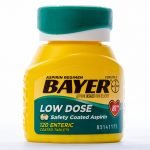Just because you take a medication regularly doesn’t mean it is safe. Routinely prescribed and even over-the-counter drugs that many people take daily can send them to the hospital with potentially dire consequences, if any mistakes are made with dosage or timing. Interestingly, it seems that just a few drugs are responsible for the vast majority of emergency hospitalizations for adverse reactions.
Every year, close to 100,000 drug-induced hospital-stays take place across the United States among those 65 or older. Recent research that took place at the Centers for Disease Control and Prevention in Atlanta found that there were four main types of drugs that had caused two-thirds of those medication-related hospitalizations.1
Unfortunately, the researchers found that the top culprits are among the most commonly taken medications. They include warfarin, which is a blood thinner, insulin, aspirin and other anti-platelet drugs, and oral diabetes medications. The drugs one might guess would be the worst offenders, such as highly addictive narcotics, were only responsible for approximately one percent of the hospitalizations analyzed. Maybe the more standard types of medications lead to problems because they are taken so often that their users feel comfortable with them and stop being careful after a while. But clearly they can all be extremely dangerous.
The study was based on records compiled from 58 hospitals around the U.S. between 2007 and 2009. The scientists examined the frequency of hospitalizations for senior citizens that took place after emergency room visits due to drug reactions. They concluded that nearly 266,000 medication-related emergency room visits occurred each year for this population. More than one-third of these — close to 100,000 instances — ended in hospitalization. And nearly two-thirds of these hospitalizations took place because there was an accidental overdose of a medication.
Warfarin, typically prescribed for those with heart disease to prevent blood clots, was hands down the biggest cause of hospitalization, accounting for 33 percent (33,171 hospitalizations) of those analyzed by the researchers. Rounding out the rest of the top four were insulin at 14 percent (13,854 hospitalizations), oral anti-platelet drugs at 13 percent (13,263 hospitalizations), and oral diabetes drugs at 11 percent (10,656 hospitalizations).
The problem was also determined to be greater with the oldest subjects. Approximately half of the emergency room visits that required hospitalization were for those patients at least 80 years old. This begs the question of whether it is truly safe to have the elderly taking dangerous medication on a daily basis. Many are careful and coherent and can easily follow the directions for correct dosing. But what about those who aren’t? In even the early stages of dementia, it would be easy for a patient to forget having taken their drugs that morning and upon seeing them on the counter, feel it necessary to take a dose. Then again, even those with caregivers are at risk, as shifts change for hired health care workers and things don’t always get written down. Adult children caregivers are not infallible either, as they usually have many other responsibilities and may not even be home at dosing times. When a medication is truly a necessity, as for instance insulin can be, the risk may be worth the benefit. But if there are other options available that would preclude the need to take one of these drugs daily, they clearly should be considered as a better alternative.
After all, pharmaceutical drugs, taken as a whole, cause an overwhelming number of deaths and emergencies every year among people of all ages…even when administered correctly. Almost seven percent of all hospitalized patients in the U.S. — or 770,000 patients — have serious adverse drug reactions within hospitals each year. Over a hundred thousand hospitalized patients die annually from drug reactions, and an additional 1.5 million need hospitalization after suffering an adverse drug reaction outside the hospital. Adverse drug reactions comprise the fourth leading cause of death in the U.S…conservatively.
The point is that pharmaceutical medications are not the safest road to health, at any age. And at best, they rarely work to resolve underlying problems. More often than not, they are prescribed purely for symptom management. The medical establishment spends too much focus treating the symptoms of the diseases we inflict upon ourselves through bad diet and unhealthy lifestyle choices. If we address the root causes of disease, we can often rid ourselves of diabetes, heart disease, and other ailments, making the drugs that “control our symptoms” totally unnecessary.
Instead of opting for pharmaceutical drugs, why not choose actual health. Why not choose a program like the Baseline of Health.
1 Budnitz, Daniel S.; Lovegrove, Maribeth C.; Shehab, Nadine; and Richards, Chesley L. “Emergency Hospitalizations for Adverse Drug Events in Older Americans.” The New England Journal of Medicine. 24 November 2011. Massachusetts Medical Society. 20 December 2011. <http://www.nejm.org/doi/full/10.1056/NEJMsa1103053>.












I enjoy your articles and
I enjoy your articles and generally agree with the philosophy espoused in them. However, I have to take issue with some of the assertions and conclusions drawn in this one. I do not have access to the original research so my observations are drawn solely from this article. First, from a statistical angle, you cannot conclude that the 4 drug areas mentioned are particularly acute causing hospitalization where narcotics are not. As you note, those are some of the most prescribed medications and thus you need to control for and normalize the data and look at hospitalization ratios based on how often its prescribed. For example, just because insulin had a higher raw number it could be that only .01% of insulin users are hospitalized in a given year but 1% of narcotics users are. That would point to a much greater concern amongst the narcotics population. Analyzing the raw numbers can lead to specious conclusions.
Second, your assertion that warfarin issues might be due to people with dementia taking the wrong or missing a dose appears to be formed to fit your conclusion. Our daughter is on a daily dose of warfarin as she was born with a serious heart defect requiring installation of a mechanical valve. It took us almost 2 years to get her dosage of warfarin normalized as there is a small range where blood INR levels are in balance. Warfarin is also greatly affected by diet and other illnesses including simple colds and stomach viruses. She’s been hospitalized at least 3x due to excessive bleeding based on her INR levels going to high. In each case, her dosage of warfarin was closely controlled by us and external factors triggered these episodes. The same is true in elderly who take warfarin as their metabolisms are delicate, they are prone to illness and even skipping or having an anomalous meal can throw it off.
Don’t make conclusions that having the elderly take a daily dose of warfarin is dangerous because their mental capacities are impaired.
Dear AJB:
You keep stating
Dear AJB:
You keep stating that the “assertions and conclusions” that you took issue with were Beth Levine’s, the person who wrote the article for the Foundation (or as you say, “your”). That is not correct. Beth was merely reporting on the results of a study published in the New England Journal of Medicine. As for interpreting statistics, what you say is true. Or as Benjamin Disraeli said, “There are three kinds of lies in the world: lies, damn lies, and statistics.” But that said, the numbers presented in the study are revealing.
The researchers used data collected between 2007 and 2009 from 58 hospitals around the country. The facilities participate in the CDC's drug event surveillance project.
The researchers looked at how often an adult 65 or older was hospitalized after emergency department visits for adverse drug events.
The researchers estimated that 265,802 visits to emergency departments for adverse drug events occurred each year from 2007 to 2009 for adults 65 or older.
Over a third of these visits, or nearly 100,000, required hospitalization. About half of the patients hospitalized were age 80 or older.
Unintentional overdose of medication was the most common reason, accounting for nearly two-thirds of hospitalizations.
When the researchers looked at the medicines most likely to cause problems, they found:
33%, or 33,171 hospitalizations, involved warfarin, a blood thinner used to prevent clots.
14%, or 13,854 hospitalizations, involved insulin.
13%, or 13,263 hospitalizations, involved oral anti-platelet drugs, such as aspirin.
11%, or 10,656 hospitalizations, involved oral diabetes drugs.
Yes, it is true as you state that narcotics might be more deadly gram for gram than insulin, but what is undeniable from the study is that the four classes of drugs listed above account for over 70% of all hospitalizations caused by adverse drug reactions. And according to the researchers, unintentional overdose of medication was the most common reason, accounting for nearly two-thirds of hospitalizations.The possible causes of those unintended overdoses are most likely varied and multiple, but they do include, as the researchers suggested things such as confusion, misreading of labels, and not fully knowing the directions when leaving the pharmacy. I’m not sure you can extrapolate from one person’s experience – your’s – that confusion among elderly patients does not play a role in at least some cases of overdosing – especially when you consider that it is estimated that approximately 1/3 of seniors over 75 exhibit symptoms of mental decline. What makes this especially disturbing is that it is likely much of this mental impairment is the result of side effects from a number of different pharmaceuticals routinely prescribed for seniors. But that’s a different story.
In any case, so far we are entirely within the study’s assertions and conclusions – not Beth’s. Beth’s personal assertions revolved around the issue that there may be more natural options that are just as effective, and far less liable to send you to the hospital. For example, for many people, proteolytic enzymes that contain things such as nattokinase may provide a safer (and yet just as effective) option to warfarin. And here at the Foundation, we would support that assertion.
Very interesting to read this
Very interesting to read this commend, however, in my interpretation, the point is missed that Warfarin, as a rat poison, was designed to cause internal bleeding, and thus kill the pests. Although certain Foods stuff may have some effect, Warfarin does what it is designed for, namely to cause bleeding; why blame the food?
It’s ok with me to make an
It’s ok with me to make an “assertion” that elderly “MIGHT” take the wrong dose or miss a dose and that the 4 drugs mentioned cause the most hospitalizations. I trust you’ve done your homework. My mother OD’d on Warfarin 5 years ago. She was 82 then and was not to blame. Her MD prescribed too high of a dose, administered by nurse in assisted living facility, and she ended up hospitalized for several days. She almost died. Her MD had her on several other drugs as well. I made a scene at the hospital and demanded the hospital staff doctors get her off the excess prescriptions. Once they did, she got better and has since lived another 5 years and is doing well. That MD left town. Taxpayers paid the price along with my mother.
I would gladly get off
I would gladly get off Warfarin if you could tell me what else to do to reduce the chance of clots due to Factor V Leidens. My Mother and Grandmother both died with clots due to this problem.
For obvious legal reasons, we
For obvious legal reasons, we cannot diagnose or prescribe for specific medical conditions – merely provide information. That said, you might want to research proteolytic enzymes on the net – particularly formulas that contain nattokinase. Then run it by your doctor to see if they are willing to work with you to see if a natural alternative might work for you.
Jon,
I have to agree, all
Jon,
I have to agree, all pharmaceuticals are dangerous. I believe they can be used to stabilize a condition, until alternative methods can take over. Take Warfarin, I have been using it for around 3 years and am working my way off of it. I have added Nattokinase(with vit.K removed)to my regimen. I added 1, 2000 fu, to my normal warfarin dose and I noticed my INR increased one point. For the next month I cut my warfarin dose in half and increased the Nattokinase to 2 pills.
I will see my INR on March 6 and go from there. I have read that Warfarin is not all that effective and has more downsides than needed.
I’ve just published a book titled “MIRACLE, How to Rebuild Your Heart”.
This is based on my personal journey and the use of supplements and herbs to achieve this. My Cardiologist would always check on me and say MIRACLE, I asked him why and he said most people don’t live as long as me and don’t keep getting better, so that became the title of my book.
Thinners can be either
Thinners can be either facilitated or suppressed, in getting into blood, by what one eats. Grapefruit is famous for enabling more uptake. If one eats grapefruit constantly, one may be able to reduce the amount of med, saving money and possibly side effects, but it depends also on an individual person’s biota and metabolism. Grapefruit has turned out to have company in affecting uptake, but I do not know what they others are. Maybe nobody knows them all.
As for hospitalization for trauma, it will be a good day when in-patient facilities agree to have acupuncturists on duty. For those who respond well, medication side-effects can be reduced.
That is one of the reasons a preventively trained M.D. I know of got himself qualified to do AC for his outpatients with chronic pain.
There are many ways to improve our horrifying iatrogenic adverse-effects profiles. I look forward to the day when less red-tape gets in the way of this and when the expressed wishes of clients (patient is often not properly descriptive for health customers) are better complied with.